Workshop Presentation - BSF | Basic Services Fund SOUTH SUDAN
advertisement
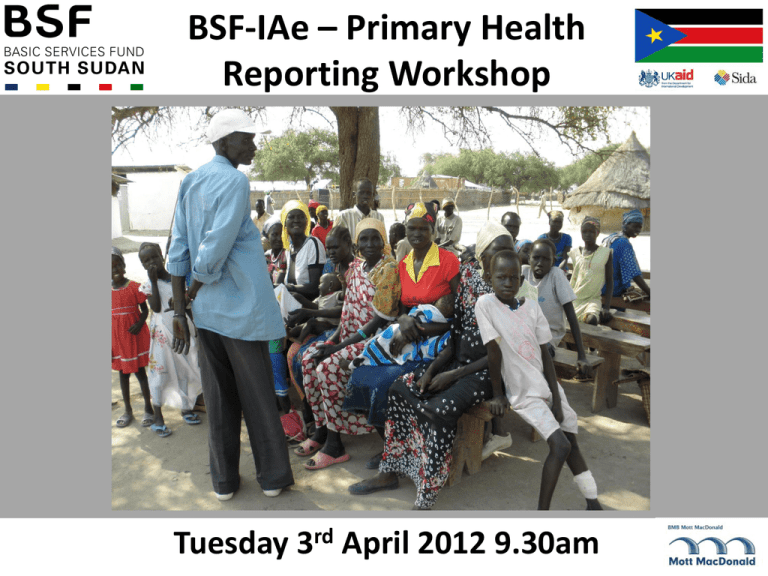
BSF-IAe – Primary Health Reporting Workshop Tuesday 3rd April 2012 9.30am AGENDA 1. Introductions 2. Narrative and Annex Reporting Format – QPR 3. BREAK 4. Information onDHIS training by BSF 5. Capacity of County Health Department 6. AOB 7. Closure (12H30) INTRODUCTION • This workshop is to introduce the new/updated reporting formats for BSF-IAe. • We are trying to better align our reporting with the MoH systems. • This is also a forum to raise concerns, issues and get feedback on reporting. • We will also get information on DHIS training. Narrative and Annex Reporting Format –QPR In this section of the workshop we will: • Highlight the new changes in the reporting format • Point out things to remember when completing the report • Allow for Questions and comments Structural Information • Population Data and Data source. We have taken out the Statistic Annex, and added this extra column for catchment population analysis. Structural Information Structural Information Converter from decimal to degrees 1. Enter decimal values Longitude Lattitude Decimal 30.84572 East Decimal 5.85301 2. Copy the three values and "paste special"-"Value" sheet Required for calculation Do not Longitude D M S change 30 50 44.59 D Latitude M S 5 51 10.84 North 31.45028 7.606111 31 0 0 0 0 0 0 0 0 0 0 0 0 0 0 0 0 0 0 0 0 0 0 0 0 27 0 0 0 0 0 0 0 0 0 0 0 0 0 0 0 0 0 0 0 0 0 0 0 0 1.00 0.00 0.00 0.00 0.00 0.00 0.00 0.00 0.00 0.00 0.00 0.00 0.00 0.00 0.00 0.00 0.00 0.00 0.00 0.00 0.00 0.00 0.00 0.00 0.00 7 0 0 0 0 0 0 0 0 0 0 0 0 0 0 0 0 0 0 0 0 0 0 0 0 36 22.00 0 0.00 0 0.00 0 0.00 0 0.00 0 0.00 0 0.00 0 0.00 0 0.00 0 0.00 0 0.00 0 0.00 0 0.00 0 0.00 0 0.00 0 0.00 0 0.00 0 0.00 0 0.00 0 0.00 0 0.00 0 0.00 0 0.00 0 0.00 0 0.00 Longitude ° ´ " D M S Latitude ° ´ " D M S Calc Calc 50.7432 51.1806 #VALUE! #VALUE! 27.01667 0 0 0 0 0 0 0 0 0 0 0 0 0 0 0 0 0 0 0 0 0 0 0 0 36.36667 0 0 0 0 0 0 0 0 0 0 0 0 0 0 0 0 0 0 0 0 0 0 0 0 Structural Information • In this phase we want to get a better picture of facility closure. • If there are further details of explanation, they can be written in the narrative report. Beneficiaries • The indicators for measuring beneficiaries are now more aligned with the DHIS indicators. Beneficiaries • Death in the health facilities has now been categorised as in the DHIS. Beneficiaries • Three new indicators are being counted : Management and Staff Payroll Staffing category: Classified: •Clinical Officers •Enrolled Nurses •Enrolled Mid-wives •Community Midwives •Lab Technicians •Pharmacy Technician •Pharmacy Assistant Unclassified: •Auxiliary Nurse •EPI Vaccinator •MCHW/Trained TBA •Support Staff Management and Staff • This section on staff payroll remains the same. Please be aware that if there are cells highlighted in GREY, they have an auto fill function – so there is no need to fill them in. Sustainability • Supervisions: We need to know how many JOINT supervisions are made in conjunction with MoH (CHD). • We want to know if the HMIS data is being transferred to the SMoH, so please follow this up. Primary Health Training • We are now collecting more detailed information about training Further Questions? BREAK DHIS • District Health Information System is a computerized reporting software/tool • The software was developed by Health information system programs HISP in South Africa • HISP - A Research and development program comprising of universities, Ministries of health, NGOs in South Africa, Malawi Mozambique, India, Nigeria Norway, Ethiopia. Etc. • The DHIS is ACCESS built database. DHIS • Introduced in South Sudan a 1 and half years ago • Designed with a user friendly interface, making it easy to train the CHD. • With the help of health NGOs every CHD is moving towards implementing this reporting system, as it is a directive from the MoH. • With assistance by BSF so far 73 individuals have received the training, with a coverage of 16 CHDs and also SMOH. Basic demonstration on software interface How the system is suppose to work DHIS Q&A on the DHIS DHIS • We would like to train our staff on DHIS how do we get on a course? • In the first instance contact Joseph Gama, DHIS/HMIS Training advisor at BSF Juba office • Email: joseph.gama@bsf-secretariat-sd.org • Tel: +249 920 558 350 • Course can be shared with other NGOs which will distribute the cost of the course. Joseph will have a good overview what courses are being planned Cont. • How many courses do we have to attend? There are 3 courses: • 1 x 4 day foundation course to DHIS • 1 x 4 day course in intermediate DHIS • BSF partners need to attend a minimum of 2 courses, although the 3 courses are recommended. Experience shows that the first training is overwhelming and that is why there is a second training. Cont. • How much does the DHIS course cost? It is cheaper to have the training with other partners involved this will cut down cost, the cost of renting hall, meals, etc… will be shared among the NGOs In-country Training • Contact: Joseph Gama as he will be able to help co-ordinate training. Cont. •Where can we download the DHIS software from? •We are having problems with the software, who do we contact? Contact: Joseph Gama, or Victor Misaka: victorson85@yahoo.ca Cont. How do we involve the CHD in DHIS? • It’s important that CHD are trained in DHIS. • There are a few options:• CHDs to attend DHIS course in a co-ordinated fashion (i.e. with County). • BSF Partners to train CHD – however this should only be done by staff who are proficiently trained on DHIS. Partners will need a 12 month plan to ensure that there is sufficient support i.e setting up with hardware/software, training, ongoing supervision. The RSS MoH are also running Training of Trainers course which may be of use. • Whichever approach is taken it is important to involve/inform the State. Lead Agents & RSS MoH. Capacity of County Health Department • Is there any feedback on concrete tools they need for organisational capacity building of CHDs? AOB Closure Please remember that the Quarterly Progress Report is due in on: Monday 16th April 2012 no later than 5pm.
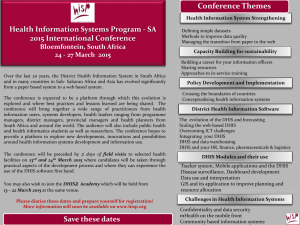
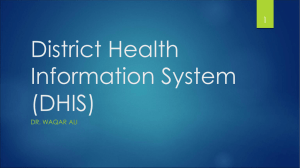
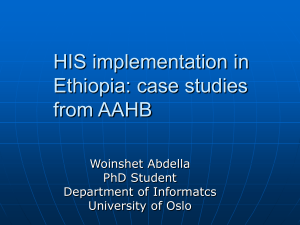
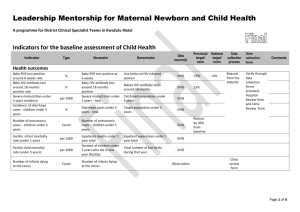
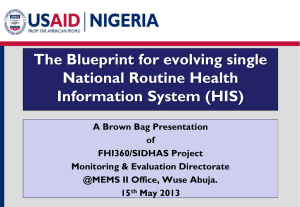
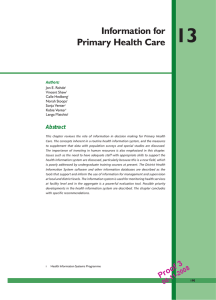




![Power_Point_Presentation_of_PF_NGOs[1]](http://s2.studylib.net/store/data/005209276_1-4fb8000425bd10982dcf0d3edfed0451-300x300.png)
